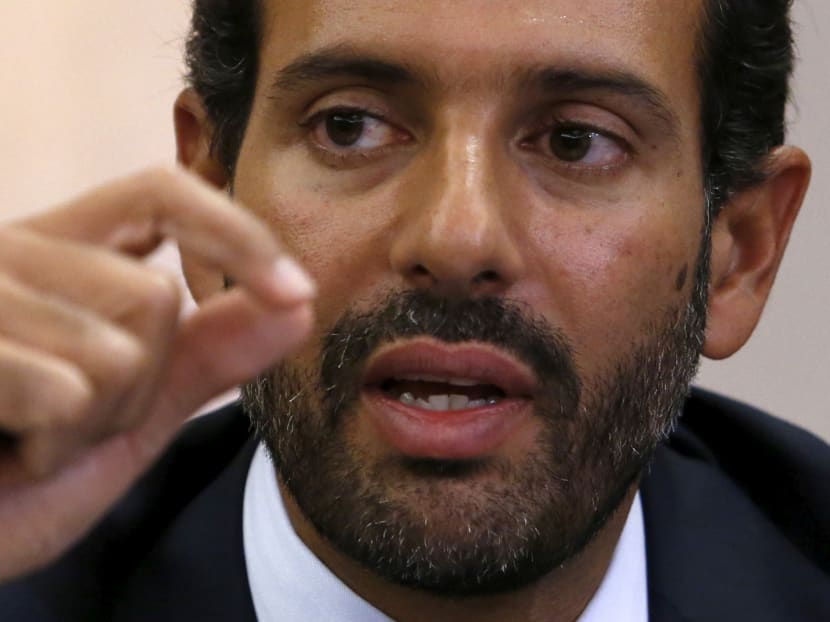Noble share price plunges 8.2% after CEO resigns
SINGAPORE — Embattled Asian commodity trader Noble Group on Monday (May 30) announced the resignation of chief executive officer Yusuf Alireza in a move that analysts said does not bode well for already-battered investor confidence, sending the company’s shares plunging more than 8 per cent in heavy trading.

Noble Groups Chief Executive Officer Yusuf Alireza speaks during a news conference after meeting with investors in Singapore August 17, 2015. Photo: Reuters
SINGAPORE — Embattled Asian commodity trader Noble Group on Monday (May 30) announced the resignation of chief executive officer Yusuf Alireza in a move that analysts said does not bode well for already-battered investor confidence, sending the company’s shares plunging more than 8 per cent in heavy trading.
Mr Alireza, 45, who was appointed CEO in 2012, decided “the time was right” to move on after helping steer the company to an asset-light model, offloading its agriculture unit and securing much-needed refinancing, Noble said in a statement before the market opened. His resignation, effective today, was for “family reasons”, Noble said, without elaborating.
Noble appointed two joint CEOs as Mr Alireza’s successors, but the move has thrown up concerns over the implementation and the effectiveness, of such a dual leadership structure. The two co-CEOs taking over the helm are Mr William Randall, currently president of Noble Group, and Mr Jeff Frase, president of Noble Americas. Mr Randall, 41, is based in Hong Kong and has been with Noble since 1997. Mr Frase, 48, based in Connecticut, joined the group from JP Morgan in New York where he was managing director and global head of oil trading.
“The co-CEO structure put in place would suggest that there was no proper succession plan. It could be that it was too sudden for them to appoint anyone, so they decided to install two CEOs to buy time while they made a decision on a permanent CEO, or perhaps one of them would get the eventual position,” said Mr Bernard Aw, market strategist at financial trading firm IG. “Furthermore, the seemingly ineffectiveness of similar leadership structures in prominent companies such as Deutsche Bank raises questions about Noble’s decision to install such a dual leadership,” he added.
Noble’s share price plunged 8.2 per cent to close at the day’s low of S$0.28, compared to the 0.2 per cent decline in the Straits Times Index (STI). More than 131.6 million Noble shares changed hands, making it the most actively traded counter in an otherwise slow Singapore trading session with the US market closed for a holiday.
“In the short term, market sentiment is likely to be affected. If a change of management could bring in structural reform going forward, however, then it is probably not bad news in the longer term,” said Ms Margaret Yang, market analyst at CMC Markets Singapore.
The co-CEO model is very uncommon. In addition to Deutsche Bank, which announced last year the two CEOs it had appointed in 2011 were resigning, others such as German software firm SAP and US social networking website Myspace previously had this power-sharing structure. In an extreme anomaly, South Korea’s Samsung Electronics currently has three CEOs.
While having more than one CEO can help a company accomplish more in a rapidly changing competitive environment, the structure can be tricky to implement. “(The co-CEO structure) only works in certain circumstances with certain people,” SAP co-founder Hasso Plattner said in 2013 after the company dissolved this leadership structure. That said, it doesn’t mean it can’t work.
“Noble has diversified businesses, so the dual leadership makes sense. However, the company is also largely driven by the chairman Richard Elman, who is an executive director on the board. The two new CEOs are more like COOs (chief operating officer)… CEO is a misnomer for Noble,” said veteran investor Mano Sabnani, who holds shares in Noble.
“The CEO was under pressure from all sides, but to my mind, he did his bit and worked hard to overcome the impact of the multiple whammies that the hit the company. He was open and articulate with shareholders and the media and explained the company situation and its initiatives well. Given the pressure on him, I would say, he has done well … Whether his exit was an outcome of push or pull factors, one may not know exactly what transpired,” he added.
“CEOs come and CEOs go in any company. It is for the board to determine that the replacement is capable enough to do the job,” said Mr David Gerald, president and CEO of Securities Investors Association (Singapore), or SIAS.
“It is expected that shareholders will be worried by the departure of Mr Alireza, who had the confidence of the retail investors. It is now up to the co-CEOs to work with SIAS to meet with the investors and keep them briefed on company developments to rebuild the confidence currently shaken,” he added.
Noble has had a very tough year and a half. In February last year, Iceberg Research raised questions about the company’s accounting practices and the way it booked profits on its deals. Noble’s shares subsequently collapsed 65 per cent last year, making it the biggest loser on the STI, before it was removed from the benchmark in March. The company also posted its first annual loss in nearly 20 years last year, as it wrote down asset values amid a commodities slump and had its credit rating cut to junk by the three leading rating agencies.
Noble today also announced it would soon be starting the sale process for Noble Americas Energy Solutions, a transaction that is expected “to substantially enhance the balance sheet”. Full details will be released in the near future, the company said. ADDITIONAL REPORTING BY RUMI HARDASMALANI





